How Can I Create A Pregnancy Safe Skin Care Routine?
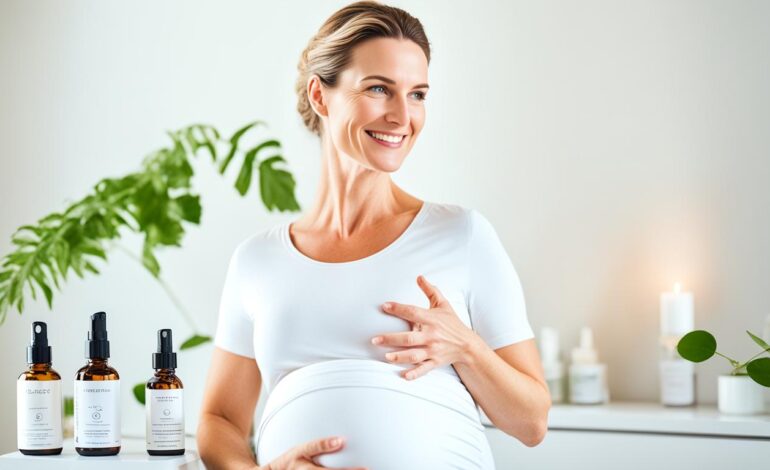
Pregnancy Safe Skin Care is an incredible journey that brings numerous changes to a woman’s body, including changes to the skin. As hormone levels fluctuate, you may experience various skin issues such as acne, dryness, dark spots, and stretch marks. It is crucial to adapt your skincare routine during pregnancy and opt for pregnancy-safe products that provide the necessary care and protection.
In this article, we will delve into common pregnancy-related skin changes, discuss skincare products to avoid, and provide practical tips for maintaining healthy skin throughout your pregnancy.
Key Takeaways: Pregnancy Safe Skin Care
- During pregnancy, your skin may undergo changes such as acne, dryness, dark spots, and stretch marks due to fluctuating hormone levels.
- Avoid skincare products containing harmful ingredients like retinoids, hydroquinone, formaldehyde, phthalates, salicylic acid, and chemical sunscreens.
- Look for pregnancy-safe skincare products that include ingredients like azelaic acid, glycolic acid, benzoyl peroxide (in limited amounts), and hyaluronic acid.
- Establish a skincare routine that includes gentle cleansing, moisturizing, daily mineral sunscreen application, and the use of hydrating creams to combat dryness and prevent stretch marks.
- Consult with a dermatologist or medical professional for personalized advice on pregnancy-safe skincare and to address specific concerns you may have.
Common Pregnancy Skin Changes
Pregnancy-related skin changes are a common occurrence due to hormonal fluctuations. These changes can affect different areas of the body and include the development of dark spots or melasma, stretch marks, and acne.
Also Read : Optimal Combination Skin Care Routine Tips
Dark spots, also known as hyperpigmentation, are patches of skin that appear darker than the surrounding areas. They can occur on the face, neck, and other parts of the body. Melasma, a specific type of hyperpigmentation, often appears as dark patches on the cheeks, forehead, and upper lip. Hormonal changes during pregnancy can trigger the overproduction of melanin, resulting in these skin discolorations.
Also Read : Skincare Routine For Problematic Skin Essentials
Stretch marks are another common skin change that occurs during pregnancy. As the body grows to accommodate the growing baby, the skin stretches rapidly, leading to the appearance of long, narrow streaks or lines on areas such as the abdomen, breasts, hips, and thighs. These stretch marks usually fade over time but may not completely disappear.
Also Read : Kids Skincare Routine Tips And Advice
Increased oil production is also a common occurrence during pregnancy, which can lead to breakouts and acne. Hormonal fluctuations can stimulate the sebaceous glands to produce more oil, resulting in clogged pores and the formation of pimples.
Also Read : Ultimate Skin Care Routine For Dry Skin Tips
While these skin changes can be bothersome for some women, it’s important to remember that they are temporary and typically fade after giving birth.
Also Read : Optimal Skin Care Routine For Oily Skin Guide
| Common Pregnancy Skin Changes | Description |
|---|---|
| Dark Spots / Hyperpigmentation | Patches of darkened skin on the face, neck, or body. |
| Melasma | Dark patches on the cheeks, forehead, or upper lip. |
| Stretch Marks | Long, narrow streaks or lines on the abdomen, breasts, hips, or thighs. |
| Acne | Breakouts and pimples caused by increased oil production. |
Skincare Products to Avoid During Pregnancy
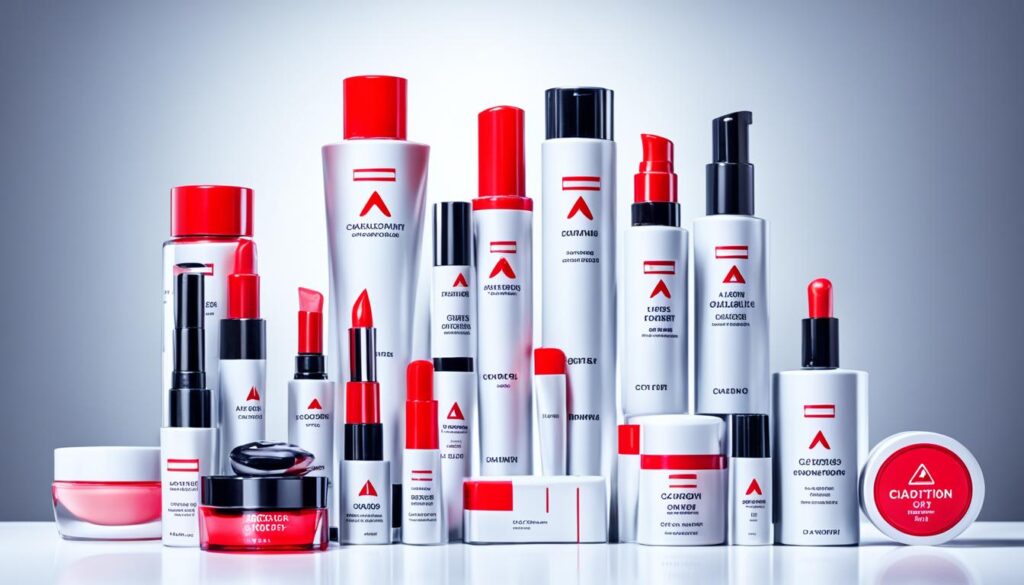
Pregnancy is a time when you want to prioritize the safety of both you and your baby. That’s why it’s crucial to be aware of the skincare products to avoid during pregnancy.
Some ingredients commonly found in skincare products can have harmful effects on the developing fetus and disrupt your hormonal balance. It’s best to steer clear of these ingredients to minimize any potential risks.
Retinoids: Retinoids, such as retinol and tretinoin, are powerful anti-aging ingredients that stimulate cell turnover. However, they have been linked to birth defects and should be avoided during pregnancy.
Hydroquinone: Hydroquinone is commonly used to treat hyperpigmentation and dark spots. However, its safety during pregnancy has not been established, so it’s best to avoid products containing this ingredient.
Formaldehyde: Formaldehyde, often listed as a preservative, can be found in nail polishes, hair straightening products, and some skincare items. It is a known carcinogen and can also cause respiratory issues.
Phthalates: Phthalates are chemicals added to many fragrances and some cosmetic products. They are linked to hormone disruption and reproductive problems. Check ingredient lists for any mention of phthalates and avoid products containing them.
Salicylic Acid: Salicylic acid is a common ingredient in acne treatments due to its exfoliating properties. However, high concentrations of salicylic acid or prolonged use can be harmful during pregnancy. It’s best to limit exposure or opt for milder alternatives.
Chemical Sunscreens: While sun protection is crucial, certain chemical sunscreens contain ingredients like oxybenzone and avobenzone that can be absorbed into the bloodstream. These ingredients have raised concerns about their effects on fetal development. Opt for physical sunscreens with zinc oxide or titanium dioxide instead.
SUMMARY TABLE: Skincare Ingredients to Avoid During Pregnancy
| Ingredient | Reason to Avoid |
|---|---|
| Retinoids | Potential birth defects |
| Hydroquinone | Safety not established |
| Formaldehyde | Known carcinogen |
| Phthalates | Hormone disruption |
| Salicylic Acid | Potentially harmful in high concentrations |
| Chemical Sunscreens | Concerns about absorption and effects on fetal development |
It’s essential to read labels carefully and avoid products containing these ingredients if you’re pregnant. Remember, it’s always better to be safe than sorry when it comes to your baby’s health.
Pregnancy-Safe Skincare Products
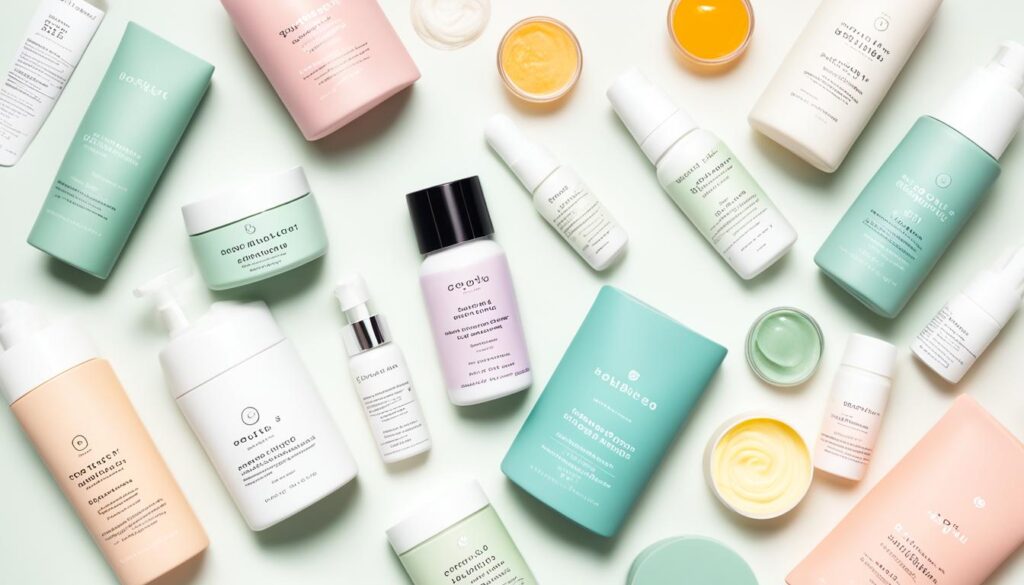
While some ingredients are to be avoided during pregnancy, there are still many skincare products that are safe to use. Look for products containing pregnancy-safe ingredients like azelaic acid, glycolic acid, benzoyl peroxide (in limited amounts), and hyaluronic acid. These ingredients can help with breakouts, fine lines, and moisture retention.
During pregnancy, many women experience changes in their skin due to hormonal fluctuations. It’s common to have increased oil production, leading to breakouts, or dryness and fine lines. Pregnancy-safe skincare products can help address these concerns without posing any harm to you or your baby.
Azelaic acid is a gentle yet effective ingredient that helps reduce acne and even out skin tone. It has antimicrobial properties that target acne-causing bacteria and also promotes cell turnover, reducing the appearance of dark spots and hyperpigmentation.
Glycolic acid, derived from sugarcane, is known for its exfoliating properties. It helps remove dead skin cells, unclog pores, and improve skin texture, leaving it smoother and brighter. Keep in mind that the concentration of glycolic acid in skincare products should be moderate for safe use during pregnancy.
Benzoyl peroxide, when used in limited amounts, can be effective in treating acne. It works by killing acne-causing bacteria and reducing inflammation. However, high concentrations of benzoyl peroxide should be avoided during pregnancy, as they can be harsh and potentially irritating to the skin.
Hyaluronic acid is a pregnancy-safe ingredient that helps in retaining moisture and keeping the skin hydrated. It has the ability to hold up to 1000 times its weight in water, making it an excellent ingredient for plumping and smoothing the skin.
When shopping for pregnancy-safe skincare products, always read the labels and look out for these beneficial ingredients. It’s also important to consider other factors such as fragrance-free products, as pregnancy can make you more sensitive to certain scents. Opt for gentle cleansers, moisturizers, and mineral sunscreens to complete your pregnancy skincare routine.
Remember, every pregnancy is unique, and it’s essential to consult with your doctor or dermatologist before making any changes to your skincare routine. They can provide personalized recommendations and ensure that the products you choose are safe for use during pregnancy.
Tips for Healthy Pregnancy Skin
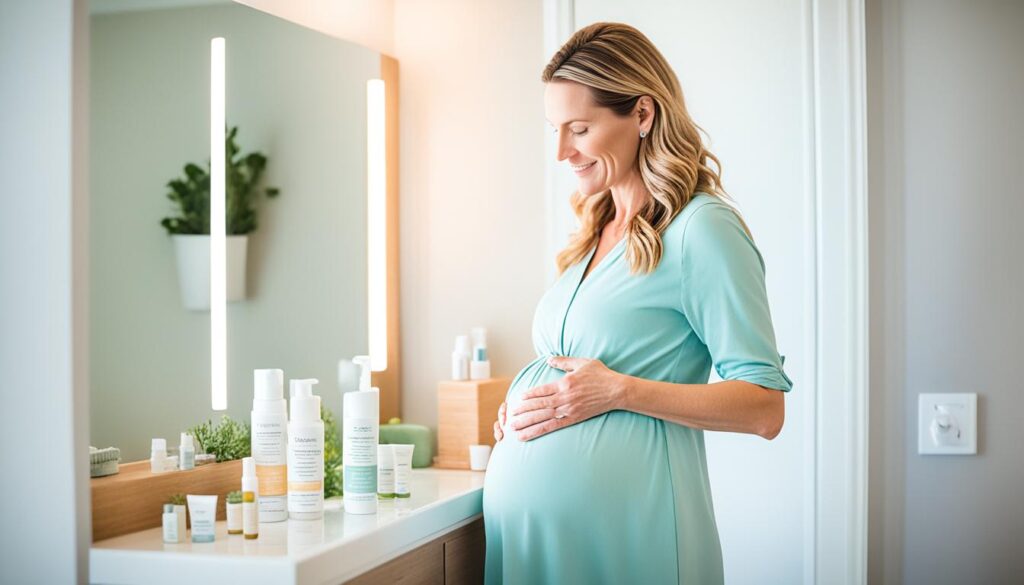
Creating a skincare routine during pregnancy is essential for maintaining healthy skin. Hormonal changes can affect the complexion, leading to issues like acne, dryness, and increased sensitivity. By following these tips, you can help keep your skin looking and feeling its best throughout your pregnancy.
Cleanser
Choose a gentle cleanser that is formulated specifically for sensitive skin. Avoid harsh ingredients like fragrances and sulfates, as they can strip the skin of its natural oils. Cleanse your face twice a day, once in the morning and once at night, to remove impurities and keep your skin fresh and clean.
Moisturizer
Hydration is key during pregnancy, as it can help alleviate dryness and maintain the skin’s elasticity. Look for a moisturizer that is rich in hydrating ingredients like hyaluronic acid and shea butter. Apply it daily after cleansing to lock in moisture and keep your skin supple and smooth.
Mineral Sunscreen
Protecting your skin from the sun’s harmful UV rays is crucial, especially during pregnancy when the skin is more susceptible to pigmentation changes. Opt for a mineral sunscreen with at least SPF 30 that contains ingredients like zinc oxide or titanium dioxide. Apply it generously to your face and exposed areas 30 minutes before sun exposure, and reapply every two hours or after sweating or swimming.
Hydrating Creams
To combat dryness and prevent stretch marks, incorporate hydrating creams into your skincare routine. Look for products that contain ingredients like cocoa butter, almond oil, or shea butter. Massage the cream onto your belly, breasts, and thighs to help nourish and moisturize the skin, promoting elasticity and reducing the appearance of stretch marks.
Dermatologist Consultation
It’s always a good idea to consult with a dermatologist during pregnancy, especially if you have specific skin concerns or conditions. They can provide personalized advice and recommend safe skincare products and treatments for you to use. A dermatologist can also help address any changes or issues that arise during pregnancy and guide you on how to adapt your skincare routine accordingly.
Following these tips and incorporating a pregnancy-safe skincare routine can help you maintain healthy and radiant skin throughout your pregnancy journey. Remember to prioritize gentle cleansers, hydrating moisturizers, mineral sunscreens, and regular consultations with a dermatologist to ensure the best care for your skin during this special time.
Expert Advice on Pregnancy-Safe Skincare

When it comes to pregnancy-safe skincare, it’s crucial to seek expert advice from a doctor or dermatologist. Each pregnancy is unique, and consulting with a healthcare professional can provide tailored recommendations based on your individual needs. They can guide you in developing a safe and effective skincare routine, incorporating active ingredients that are suitable for pregnancy.
Doctors and dermatologists can offer valuable insights on the best skincare products to use during pregnancy. With their expertise, they will recommend specific active ingredients that are gentle yet effective for addressing common skin concerns. Through their conservative approach, they can advise you on avoiding unnecessary products and focusing on the essentials.
The doctor’s recommendations will take into account pregnancy-related skin changes and adjust your skincare routine accordingly. This personalized approach ensures that you are using products that are safe for both you and your baby. Doctors may suggest ingredients such as azelaic acid, glycolic acid, or hyaluronic acid to address concerns like acne, fine lines, and moisture retention.
“Consulting with a dermatologist or doctor during pregnancy is essential as they have the knowledge and expertise to guide you through the journey. They can recommend pregnancy-safe skincare products and advise on the best skincare routine for your changing skin needs.”
By following the recommendations of healthcare professionals, you can maintain healthy and radiant skin throughout your pregnancy. Their guidance will help you navigate the world of skincare confidently, ensuring that you are making choices that prioritize your well-being and safety. Remember, a conservative approach backed by expert advice is key to achieving a pregnancy-safe skincare routine.
Active Pregnancy-Safe Ingredients
| Ingredient | Benefit |
|---|---|
| Azelaic Acid | Reduces acne and inflammation |
| Glycolic Acid | Exfoliates and improves skin texture |
| Benzoyl Peroxide | Treats acne (in limited amounts) |
| Hyaluronic Acid | Hydrates and plumps the skin |
Pregnancy Skincare Concerns and Treatments
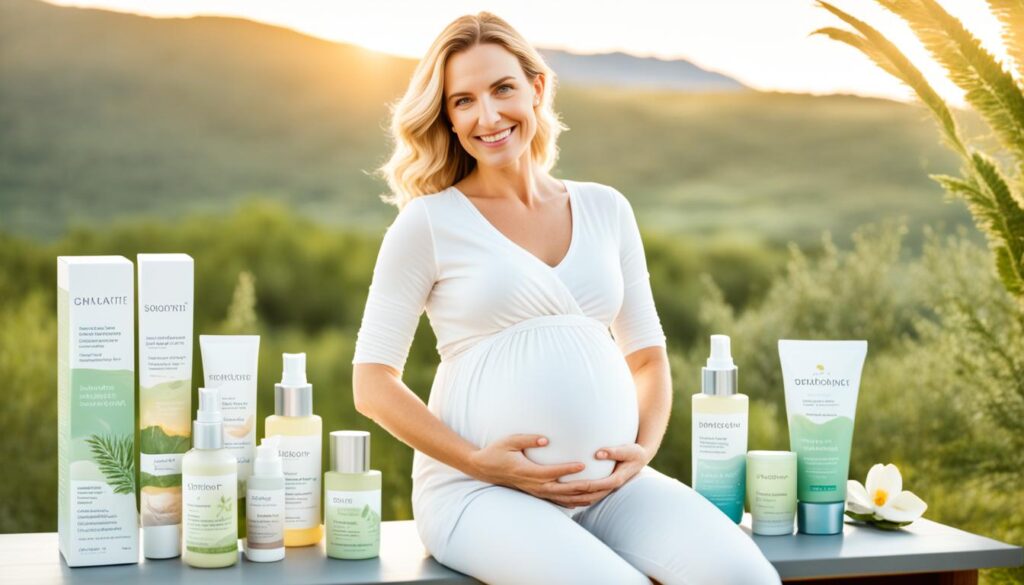
Pregnancy can bring about various skincare concerns such as melasma, hormonal acne, dry skin, redness, increased sensitivity, and hyperpigmentation. Treating these concerns may require specialized skincare treatments to alleviate the discomfort and address specific issues.
Gentle exfoliation with AHAs (alpha hydroxy acids) can help improve skin texture and address melasma and hyperpigmentation. These acids work by removing the dead surface cells, encouraging cell turnover, and promoting a brighter complexion.
Using calming masks and moisturizers can help soothe redness, reduce dryness, and provide hydration to the skin. Look for products containing soothing ingredients like aloe vera, chamomile, and oatmeal.
Avoiding irritants, such as harsh chemicals and fragrances, is crucial during pregnancy. Opt for gentle skincare products specifically formulated for sensitive skin. These products are less likely to cause irritation or exacerbate existing skin concerns.
It’s also essential to protect your skin from UV-induced hyperpigmentation by incorporating a broad-spectrum sunscreen with at least SPF 30 into your daily skincare routine. Look for sunscreens that use physical blockers like zinc oxide or titanium dioxide, which are generally considered safe during pregnancy.
By addressing pregnancy skincare concerns with appropriate treatments and practices, you can maintain a healthy and nourished complexion throughout your pregnancy journey.
Skincare Ingredient Restrictions During Pregnancy
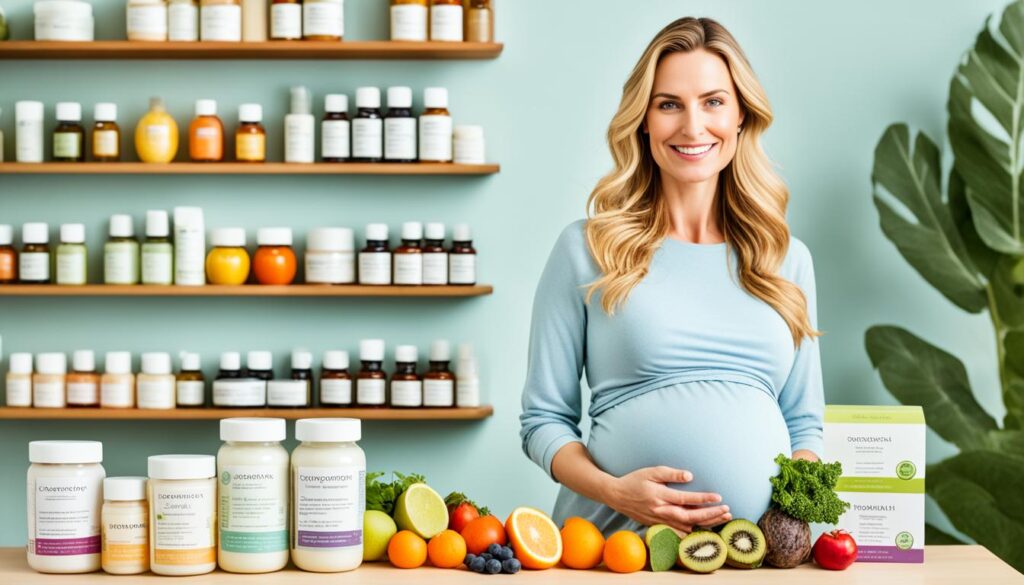
During pregnancy, it’s essential to be cautious about the skincare ingredients you use. Some ingredients can potentially harm the baby and should be avoided. Always remember to read product labels and consult with medical professionals to ensure the safety of the ingredients you use during pregnancy. Here are some common skincare ingredients to avoid:
Retinol
Retinol, a form of vitamin A, is a popular ingredient in many anti-aging skincare products. However, during pregnancy, it’s best to avoid products containing retinol. **Retinol** has been linked to potential birth defects and should be used with caution.
Phthalates
Phthalates are chemical compounds commonly found in fragrances, lotions, and nail polishes. These **phthalates** have been associated with developmental issues in babies, so it’s important to avoid products containing these chemicals.
Ammonia
Ammonia is often found in hair dyes and some skincare products. **Ammonia** can be absorbed through the skin and should be avoided during pregnancy, as it may cause adverse effects on both the mother and the baby.
Certain Essential Oils
While essential oils can have many benefits, certain oils should be avoided during pregnancy. Essential oils like rosemary, clary sage, and lavender are known to stimulate the uterus and may lead to contractions. It’s best to consult with a healthcare professional before using any essential oils during pregnancy.
By being informed about skincare ingredient restrictions during pregnancy, you can make safe and healthy choices for you and your baby. Always seek professional advice and opt for pregnancy-safe alternatives to ensure the well-being of both you and your little one.
| Skincare Ingredients to Avoid During Pregnancy |
|---|
| Retinol |
| Phthalates |
| Ammonia |
| Certain Essential Oils |
Best pregnancy-safe sunscreens
The best pregnancy-safe sunscreens offer broad-spectrum protection against UVA and UVB rays while being free from harmful chemicals like oxybenzone, avobenzone, and octinoxate. Look for mineral-based formulas containing zinc oxide or titanium dioxide, as these are generally considered safe during pregnancy. Additionally, opt for products labeled “pregnancy-safe” or “dermatologist-recommended.” Fragrance-free and hypoallergenic options are preferable to minimize the risk of skin irritation. Remember to reapply sunscreen every two hours, especially if you’re spending time outdoors. Consulting with a healthcare provider is always recommended to ensure the chosen sunscreen aligns with individual needs during pregnancy.
Skin care ingredients that might not be safe during pregnancy
During pregnancy, it’s crucial to avoid skincare ingredients that could potentially harm the developing baby. Some substances to steer clear of include retinoids (such as Retin-A, Retinol), salicylic acid in high concentrations, hydroquinone, formaldehyde, and certain essential oils like rosemary and peppermint. Additionally, chemicals like oxybenzone and avobenzone found in some sunscreens can be concerning. Always scrutinize product labels and prioritize gentle, pregnancy-safe alternatives. Consulting with a dermatologist or obstetrician is wise to ensure the skincare routine remains safe and effective throughout pregnancy.
Best pregnancy-safe moisturizers
The best pregnancy-safe moisturizers are those formulated with gentle, nourishing ingredients that hydrate and soothe the skin without containing potentially harmful substances. Look for products free from retinoids, salicylic acid, hydroquinone, and artificial fragrances. Opt for moisturizers enriched with ingredients like hyaluronic acid, glycerin, shea butter, and coconut oil, known for their hydrating and moisturizing properties. Additionally, choosing products labeled as “pregnancy-safe” or “dermatologist-recommended” can provide peace of mind. Always consult with a healthcare provider or dermatologist to ensure the chosen moisturizer aligns with individual skincare needs during pregnancy.
Best pregnancy-safe acne treatments
The best pregnancy-safe acne treatments are those that effectively address breakouts while being gentle and free from potentially harmful ingredients. Look for products containing ingredients like benzoyl peroxide, which is considered safe in limited concentrations during pregnancy. Additionally, skincare products with glycolic acid or lactic acid can help exfoliate the skin and unclog pores without posing risks to the developing baby. Natural remedies like tea tree oil may also be suitable for some individuals. However, it’s essential to consult with a healthcare provider or dermatologist before using any acne treatment during pregnancy to ensure it’s safe and appropriate for your specific situation.
Also Read: Top Foods For Healthy Skin – Glow Up Naturally!
Conclusion
Maintaining a pregnancy safe skincare routine is essential for the health of both the mother and the baby. During pregnancy, the body goes through various changes, including pregnancy-related skin concerns. It’s important to be aware of these changes and adjust your skincare routine accordingly.
Consulting with experts and following their advice is crucial in ensuring a healthy and safe skincare routine. Dermatologists and healthcare professionals can provide expert advice on safe skincare ingredients and products to incorporate into your routine. They can also address any specific pregnancy skincare concerns you may have.
By using pregnancy-safe skincare products and avoiding harmful ingredients, you can effectively address pregnancy skincare concerns such as acne, dark spots, dryness, and stretch marks. Focus on incorporating safe ingredients like azelaic acid, glycolic acid, and hyaluronic acid into your routine to maintain a healthy and glowing complexion.
Remember, each pregnancy is unique, and what works for one person may not work for another. So, it’s essential to consult with experts and take a conservative approach when it comes to skincare during pregnancy. By doing so, you can enjoy beautiful and radiant skin throughout your pregnancy journey.
FAQs
Q: What are pregnancy-safe skin care products?
A: Pregnancy-safe skin care products are products that are considered safe to use during pregnancy, as they do not contain harmful ingredients that could potentially harm the developing fetus.
Q: How can I create a pregnancy-safe skin care routine?
A: To create a pregnancy-safe skin care routine, opt for products that are free from ingredients like retinoids, salicylic acid, and formaldehyde. Stick to gentle cleansers, moisturizers, and sunscreens that are specifically formulated for pregnant women.
Q: Are there certain skin care ingredients to avoid during pregnancy?
A: Yes, there are certain skin care ingredients to avoid during pregnancy, such as retinoids, salicylic acid, hydroquinone, and formaldehyde. These ingredients can potentially harm the baby or cause skin irritation.
Q: Can pregnancy cause changes to your skin?
A: Yes, pregnancy can cause changes to your skin due to hormonal fluctuations. Some women experience an increase in acne, melasma (dark patches on the skin), or skin sensitivity during pregnancy.
Q: What is the pregnancy glow?
A: The pregnancy glow refers to the radiant and glowing skin that some pregnant women experience due to increased blood flow and hormonal changes. It is a natural and temporary effect of pregnancy.
Q: How do I treat acne during pregnancy?
A: To treat acne during pregnancy, opt for gentle cleansers, non-comedogenic moisturizers, and topical treatments that are considered safe for use during pregnancy. Avoid harsh acne products that contain ingredients like benzoyl peroxide or salicylic acid.
Q: Can certain skin care products be safe to use during pregnancy?
A: Yes, certain skin care products are safe to use during pregnancy, such as products that are specifically labeled as pregnancy-safe or formulated with gentle, pregnancy-friendly ingredients. Always consult with your healthcare provider if you are unsure about specific products.
